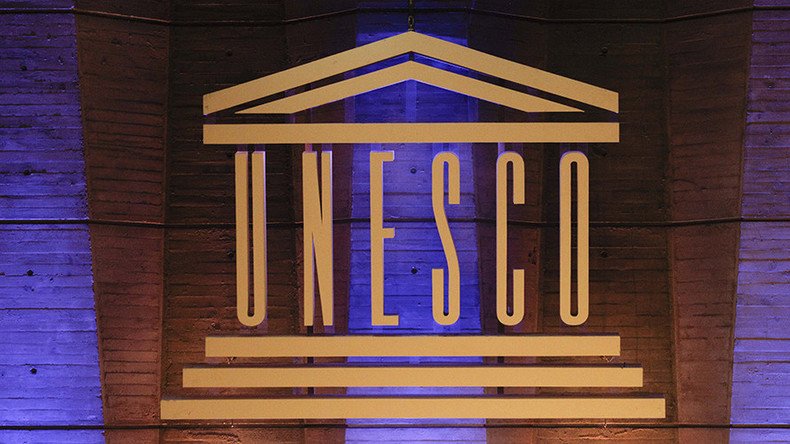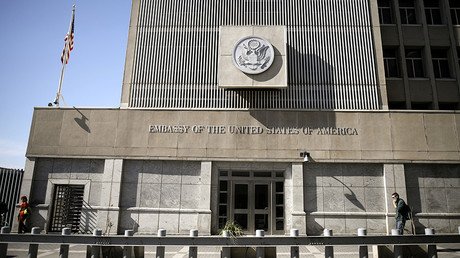US withdraws from UNESCO, cites ‘continuing anti-Israel bias’

The United States and Israel have declared they are officially withdrawing from UNESCO, the UN’s cultural body which the US helped found in 1945, citing a distortion of history and bias against Israel. The US is to depart on December 31, the State Department said.
"This decision was not taken lightly, and reflects US concerns with mounting arrears at UNESCO, the need for fundamental reform in the organization, and continuing anti-Israel bias at UNESCO," the State Department said in a Thursday statement cited by Reuters.
Washington will remain in the organization "as a non-member observer state in order to contribute US views, perspectives and expertise," the statement said. There has been no immediate comment from the US government.
Israel too announced it was leaving the body a few hours after the Americans made their statement, with Prime Minister Benjamin Netanyahu accusing UNESCO of distorting history.
"This is a brave and moral decision, because UNESCO has become a theater of absurd. Instead of preserving history, it distorts it," he said.
Earlier, Washington officials told AP that the United States is withdrawing from UNESCO after repeated criticism of resolutions that the Trump administration perceived as anti-Israeli.
UNESCO Director General Irina Bokova said she received official notification from Secretary of State Rex Tillerson, adding she expressed "profound regret at the decision of the United States of America to withdraw from UNESCO."
Washington's move was "a loss for multiculturalism and the UN family," she added.
In a statement released later on Thursday, Bokova said: "At the time when the fight against violent extremism calls for renewed investment in education, in dialogue among cultures to prevent hatred, it is deeply regrettable that the United States should withdraw from the United Nations agency leading these issues."
She added that in 2011, when the US stopped funding the organization, "I was convinced UNESCO had never mattered as much for the United States, or the United States for UNESCO."
Vladimir Tolstoy, the Russian president’s cultural adviser, said that the United States’ withdrawal from the body was a bad sign.
“It seems to me this is a bad sign in either case, one that looks worse on the United States rather than UNESCO.”
The US stopped financing UNESCO after the organization moved to admit the Palestinian Authority as a member in 2011. However, the State Department has maintained a mission at the agency’s Paris headquarters.
I deeply regret the decision of the United States of America to withdraw from @UNESCO.Official statement: https://t.co/ACgqUKVLBipic.twitter.com/xHTvJNt6tm
— Irina Bokova (@IrinaBokova) October 12, 2017
Americans played a pivotal role during UNESCO's formation. Archibald MacLeish, the first US member of UNESCO’s governing board, authored the preamble to its 1945 Constitution, according to the State Department.
The constitution's spirit gained fame due to its opening lines: "Since wars begin in the minds of men, it is in the minds of men that the defenses of peace must be constructed."
The US joined UNESCO as a founding member but pulled out in 1984 because of "a growing disparity between US foreign policy and UNESCO goals." After 19 years, Washington rejoined the organization in October 2003.
'If America can’t keep its promises, there’s a problem'
The State Department gave several reasons for the US withdrawing from UNESCO, such as debt and organizational mismanagement. But the US may also be affirming its support for Israel, according to Haaretz senior correspondent and columnist Amir Oren.
“There have been several [UNESCO] resolutions which contended with the Israeli, or more accurately the Jewish version of the status of Jerusalem, and one can indeed quarrel with the question whether its cultural, religious, political… there are many layers to Jerusalem of course,” Oren told RT.
“Israel considers UNESCO to be anti-Israel, and therefore when the United States wants to show that it’s pro-Israel, it becomes anti-UNESCO.”
But the withdrawal of the US from other international bodies and treaties, such as the nuclear deal with Iran, also sets a worrying precedent, said fellow Haaretz journalist Gideon Levy.
“If a signed agreement by the biggest superpower is just worth the paper it is signed on, then we really face a much broader problem,” he told RT. “If the word of the United States is not its word, then it’s still a problem."
What’s more, while organizations such as UNESCO have their flaws, that is no reason to simply leave them and stop working with the international community.
“What Donald Trump is doing now with the assistance of Israel is very, very regrettable and will damage the international community. It’s very destructive.”















